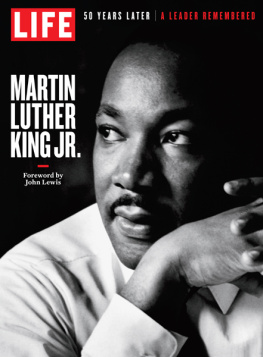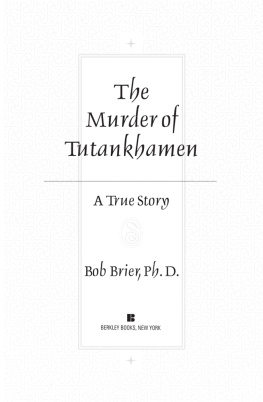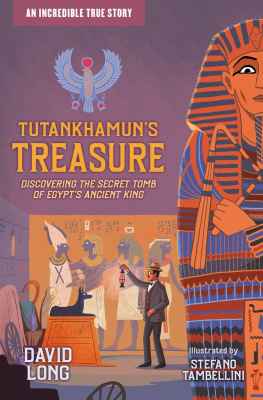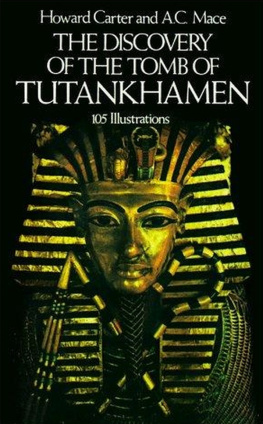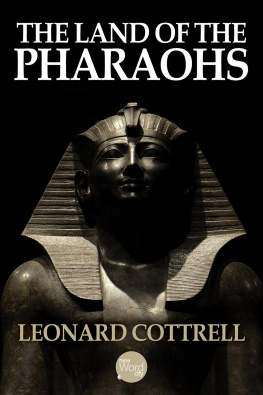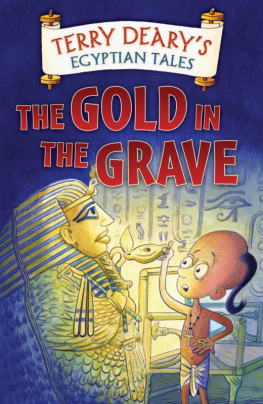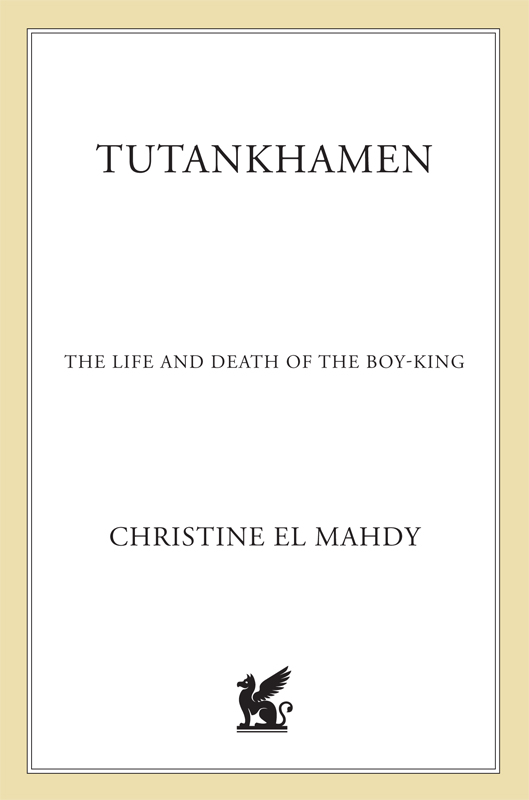
The author and publisher have provided this e-book to you for your personal use only. You may not make this e-book publicly available in any way. Copyright infringement is against the law. If you believe the copy of this e-book you are reading infringes on the authors copyright, please notify the publisher at: us.macmillanusa.com/piracy.
Contents
This book is dedicated to my beautiful daughters, Nadine and Yasmine.
Foreword
Archaeology has two distinct faces. Its public face is exciting, a dazzling roll-call of excavations, unveiling treasures of gold, of which the discovery of Tutankhamens tomb in 1922 is one of the most extraordinary examples. Its private face is the time-consuming, meticulous examination of often tiny and seemingly meaningless fragments of dusty materials in the forgotten back rooms of small museums a much less glamorous pursuit. Yet it is in those back rooms that the most exciting discoveries are often made. After all, what does the discovery of a gold-filled tomb indicate? That the owner of the tomb was rich and royal? We know that already. The thorough examination of small finds after the initial excitement, on the other hand, can tell us hitherto unknown details about the person who was entombed. The forensic detective work involved in archaeology can tell us things about the dead that they themselves might have scarcely realised were there when alive.
I have always been fascinated by archaeologys private face. My interest began by chance when I was seven years old living in Bolton, in the north of England. Thrust for the first time into an adult library, I picked up by chance a book about ancient Egypt. I entered what seemed to me a more magical world than that of fairytales, because this world was exotic, yet filled with real people. I examined the reproductions of their paintings and their sculptures, and the world of ancient Egypt became a place of enchantment for me. The following day I persuaded my father to take me to the local museum. Here, I could see a mural through the fanlight of a door, but I could not get into the gallery as it was not finished. Over the following months I devoured everything I could on the subject, even teaching myself the meanings of the basic Egyptian hieroglyphs so that I could read their words for myself. By the age of nine, I knew what I wanted to be an Egyptologist, though no one I knew seemed to have heard of it!
Among the first stories about Egypt that I had read when I was seven was that of Tutankhamen, the boy-King of the Eighteenth Dynasty. The discovery of the tomb and its astounding treasures had long aroused wonder among the public at large. But I found the private face of Tutankhamen far more intriguing than the alluring glitter of the gold he was buried with. It was a story of a young boy, of about my own age at that time, who had become the most powerful person in the world the equivalent, today, of a child elected President of the United States. Yet the story was also steeped in mystery. The tomb told us he was a king, and a very wealthy one. But who was he? Who were his parents? What sort of childhood had he had? What must he have felt like, knowing that he could have everything he wanted, that everyone around him would do exactly what he wanted? And how could such a young boy have died so unexpectedly? I read all the books available, trying to find out the truth if there is ever any truth in history. But the things I wanted to know were just not there. No one seemed to know who Tutankhamen really was. The stories that the books told about him just did not seem to make sense.
I was determined to find out more. I became a detective searching through time itself, and it has taken me almost a lifetime to put what I have found together. Sometimes, for months or even years, I came across areas of Tutankhamens life that were shrouded in impenetrable darkness; and then, suddenly, unexpectedly, and often from completely unsuspected places, another tiny bit of information would emerge, and cast a little more light on these mysteries.
My search for the real Tutankhamen has been somewhat akin to the search for a murderer in a TV detective soap. The detectives in these programmes are given blatant clues that invariably lead to the wrong answer; the wrong people have accusing fingers pointed at them; then along comes another, more painstaking, detective looking at the apparently insignificant bits of evidence and starting to ask questions about things that do not fit; and another story starts to emerge people start to ask themselves, Why didnt I see that? It seems so obvious! It seemed to me, even at seven, that people were too quick to jump to conclusions. After all, an almost intact tomb had been found so the answers had to be there somewhere if the science of forensics was valid. A group of people living 3500 years ago had deliberately chosen and assembled the objects that they thought were most important to Tutankhamen, and somewhere in those pieces must be the information we needed.
Almost twenty years and several degrees after I had first started my studies of ancient Egypt, a twist of fate brought me back to Bolton Museum where I had begun, but now as a student of Egyptology working as a volunteer to gain first-hand experience of identifying pieces. Of course, there was nothing from Tutankhamens tomb for me to examine in Bolton. But like any good detective, I worked slowly around the edges of the crime. If I was to find out who Tutankhamen was, I needed to know more about the people around him.
As he had come to the throne when he was about six or seven years old, he must have been born in the middle of the reign of Akhenaten, the monarch called by many scholars the heretic King. Akhenaten is one of the most charismatic, elusive and fascinating individuals in history. He broke away from centuries of conformity in Egypt to do his own thing. Like an ancient Egyptian hippy, he left home, found his own place to live with his supporters around him, changed every aspect of life he could and lived thenceforward in splendid isolation at the site we call today Tell el Amarna, halfway between Cairo and Luxor. Unfortunately for Egypt and for history, Akhenaten was born to be king. If he had been an ordinary man, a religious leader perhaps, posterity would have regarded him more kindly. But as King of Egypt, he had responsibilities towards his country and his people, responsibilities that he clearly shirked. Whether he did this deliberately is open to question. But after his reign, Egypt was never the same again. And Tutankhamen, his successor, was thus born in the middle of a state crisis.
The site of Tell el Amarna is, archaeologically speaking, a time capsule. Founded in the fourth year of Akhenatens reign, it was occupied until he died thirteen years later, and inscriptions there show that Tutankhamen probably lived there for a short time afterwards before the city was completely abandoned. In all probability, Tutankhamen was born and spent his childhood here before he was made King within the city. It was in these streets that he had once played. What evidence could I find of him there? My intellectual search for his roots led me to deepen my researches into Tell el Amarna.
The site of Tell el Amarna today, although currently almost inaccessible to tourists because of political problems caused by the recent upsurge of Islamic fundamentalism in Egypt, is an abandoned, empty desert plain. After the death of Tutankhamen, perhaps a decade later, the implacable enemy of the old royal family, the Commander-in-Chief of the Egyptian army General Horemheb, seized the throne in what was apparently a military coup and systematically started to erase all memories of the whole family of the mid-Eighteenth Dynasty. Horemheb and his friend and successor Pramesse, later Ramesses I of the Nineteenth Dynasty, referred to Akhenaten henceforward as the Great Criminal. For the ancient Egyptians, immortality came through the remembrance of your name. If someone should refer to you by name in 3000 years time, then to all intents and purposes you have achieved immortality; destroy that name, and your very existence is obliterated. The Ramesside rulers of the Nineteenth Dynasty tried to destroy all evidence of Akhenaten and his successors. They smashed statues, dismantled buildings and erased names. Only Tutankhamen has survived to us, by an accident of fate, through his tomb.


